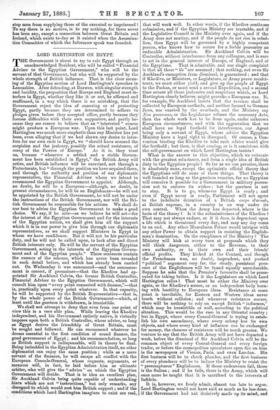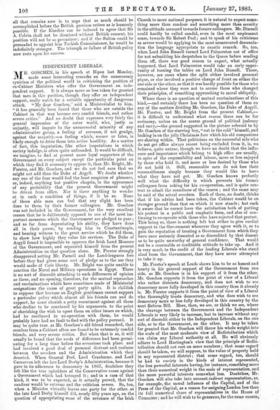LORD HARTINGTON ON EGYPT.
THE Government is about to try to rule Egypt through an unacknowledged Resident, who will be called "Financial Adviser to the Egyptian Government," who will be the servant of that Government, but who will be supported by the whole strength of British influence. That is the clear mean- ing of the Egyptian section of Lord Hartington's speeches in Lancashire. After defending, at Darwen, with singular strength and lucidity, the proposition that Europe and England must in- terfere in Egypt, whether they like it or not, he affirmed and reaffirmed, in a way which there is no mistaking, that the Government reject the idea of annexing or of protecting Egypt, partly because they are determined to .adhere to pledges given before they accepted office, partly because they foresee difficulties with their own supporters, and partly be- cause they see reason to believe that an " interested " coarse might produce a European war. Upon this last point, Lord Hartington was much more emphatic than any Minister has yet been, even alleging that if we had shown any desire to inter- fere for our own ends in Egypt, we "should have aroused the suspicion and the jealousy, possibly the actual resistance, of many of the Powers of Europe." As it is, they trust us, because "whenever a settled and a stable Govern- ment has been established in Egypt," the British Army will retire, and British influence will be exercised, not through a Protectorate, bat "through the position we have acquired there, and through the authority and position of our diplomatic representative, the Financial Adviser whom we intend to recommend the Egyptian Government to appoint: Although, no doubt, he will be a European—although, no doubt, in present circumstances, he will be an Englishman—he will not be appointed by the British Government, he will not be under the instructions of the British Government, nor will the Bri- tish Government be responsible for his actions. We shall do our best to advise the Egyptian Government to make a good choice. We say, if he acts—as we believe he will act—for the interest of the Egyptian Government and for the interests of the Egyptian nation, we shall give him all the support which it is in our power to give him through our diplomatic representatives, as we shall support Ministers in Egypt in whom we have confidence. But it will not be his particular duty, and he will not be called upon, to look after and direct British interests only. He will be the servant of the Egyptian Government, acting in the interests of the Egyptian Govern- ment and of the Egyptian people." These sentences contain the essence of the scheme, which has never been revealed in such detail before, and which has already been carried out. On Wednesday it was announced—and the announce- ment is correct, if premature—that the Khedive had ap- pointed Sir Auckland Colvin, the former British Controller, Financial Adviser to the Egyptian Government, which will consult him upon "every point connected with finance,"—that is, practically upon every point whatever. In that capacity, he will be supported by the British Representative—that is, by the whole power of the British Government—which, at least until the garrison is withdrawn, is irresistible.
We shall not attempt to deny that even from our point of view this is a very able plan. While leaving the Khedive independent, and his Government entirely native it virtually imposes upon both a British Controller, whose advice, so long as Egypt desires the friendship of Great Britain, must be sought and followed. He can recommend whatever he deems essential to the first condition of sound finance, the good government of Egypt ; and his recommendation, so long as British support is indispensable, will in theory be final. Being imbedded in the Egyptian Administration itself, no other diplomatist can enjoy the same , position while as a mere servant of the finances, he will escape all conflict with the European Consuls-General, whose requests, arguments, or menaces will, in fact, be laid before him as ultimate arbiter, who will give the " advice " on which the Egyptian Government will decide. That is in idea an excellent plan, Sir Auckland Colvin being quite capable of understanding hints which are not "instructions," but only remarks, any disregard to which would cost him British support ; and if the conditions which Lord Hartington imagines to exist are real,
that will work well. In other words, if the Khedive continues submissive, and if the Egyptian Ministry are tractable, and if the Legislative Council is the Ministry over again, and if the Army does not mutiny, and if the people do not rise in rebel- lion, then" Egypt will be governed by a highly competent person, who knows how to secure for a feeble peasantry an endurable Administration. Sir Auckland Colvin will be Controller, without interference from any colleague, and is sure to act in the general interest of Europe, of England, and of the Egyptians. That is admirable, and our single complaint is that all these "ifs " are assumed ; that nothing, not even Sir Auckland's exemption from dismissal, is guaranteed; and that if Khedive, or Ministers, or Legislature, or Army prove recalci- trant, we must either yield, and give up the people of Egypt to the Pashas, or must send a second Expedition, and a second time arouse all those jealousies and suspicions which, as Lord Harting-ton clearly believes, might provoke a European war. If, for example, Sir Auckland insists that the revenue shall be collected by European methods, and neither farmed to German Jews, nor exacted by the courbash, and the Ministry say Non possumus, or the Legislature refuses the necessary Acts, then the whole work has to be done again, under unknown European circumstances, and with the aggravation that we shall have no legal foothold for interference, our Agent being only a servant of Egypt, whose advice the Egyptian Ministry have a legal right to disregard. Of course a Con- vention binding the Khedive to take such advice would give the foothold ; but then, is that coming, or is it consistent with the self-government on which Lord Hartington insists ?
What is the answer to this objection, which we reiterate with the greatest reluctance, and from a single idea of British duty to the Egyptian people ? So far as we can perceive, there is absolutely none, except the optimistic official theory that the Egyptians will do none of these things. That theory is well founded so long as the garrison remains, for no Egyptian will conceive it possible for a Government in military posses- sion not to enforce its wishes ; but the garrison is not to stay. It is to go, whenever Egypt is ready ; and even if Egypt never is ready, Parliament will not agree- to the indefinite detention of. a British corps d'arine'e, at British expense in a country in no way under its own control. When the Army has departed, where is the basis of the theory ? Is it the submissiveness of the Khedive ? That may not always endure, or if it does, is dependent upon a life which is threatened every day, and may any day come to an end. Any other Mussulman Prince would intrigue with any other Power to obtain support in resisting the English- man's domination. On the compliance of the Ministry ? The Ministry will kick at every turn at proposals which they will think dangerous, either to the Revenue, to their own authority, or to their own and their friends'
official profits. They kicked at the Control, and though the- Frenchman was, no doubt, imprudent, and pushed " political " argument very far, the steady, persistent pres- sure of the Englishman will be found equally unendurable. Suppose he asks that the Premier's favourite shall be prose- cuted for taking bribes. Is it the Legislature on which Lord Hartington relies ? That must be either the Ministry over again, or the Khedive's screen, or an independent body burn- ing with hostility to European ideas. Resistance at some point is inevitable for Eastern and Western ideas never touch without collision; and whenever resistance occurs, there will be nothing to rely on except British " influence," which may be irresistible or null, according to the political situation. This would be the case in any Oriental country ; but in Egypt, where every Consul-General is trying to estab- lish his own ascendancy, where every colony has its own objects, and where every kind of influence can be exchanged for money, the chances of resistance will be much greater. We venture to say that the British Army will not have departed a week, before the dismissal of Sir Auckland Colvin will be the common object of every Consul-General and every foreign trader, or before the cosmopolitan speculators open fire on him in the newspapers of Vienna, Paris, and even London. His first business will be to check plunder, and the first business of every plunderer will be to induce the Ministry to resist the "presumptuous" Englishman. If those endeavours fail, there is the Sultan ; and if he fails, there is the Army, which will once more be taught that it is sacrificed to the interests of Infidels.
It is, however, we freely admit, almost too late to argue. Lord Hartington would not have said as much as he has done, if the Government had not decisively made up its mind, and all that remains now is to urge that as much should be accomplished before the British garrison retires as is humanly possible. If the Khedive can be induced to agree that Sir A. Colvin shall not be dismissed without British consent, his position will not be so precarious ; and if the Sultan could be persuaded to appoint him Turkish Commissioner, he would be indefinitely stronger. The triumph or failure of British policy now rests upon his success.







































 Previous page
Previous page